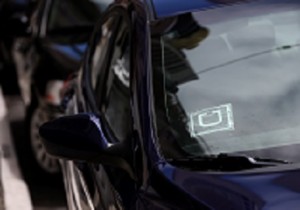Uber Tried To Make Biglaw A Gig Economy. Biglaw Told Them To Cram It.
Clients are always trying to get more for less, but there's a line between smart business and taking advantage.

(Photo by Justin Sullivan/Getty Images)
The greatest gift that high stakes litigation can bestow upon the outside observer is some unrelated yet ultimately embarrassing insights that can run off and become a story unto itself. Sometimes phone calls to prostitutes come up in a lawsuit about football coaching prowess, other times emails reveal a startup so convinced of its own hype that it thinks it can turn its law firm into another poor schlub doing their bidding for crumbs. This is the latter story, and the best part is Uber is still blinded by the hype — they’re the ones revealing to the world how much they suck to work for.
As Uber wages an intellectual property showdown with Google’s Waymo over driverless car technology, Uber filed a motion detailing the disintegration of its professional relationship with Quinn Emanuel, who now represents Waymo. Uber sees a conflict, while Quinn retorts that nothing could be further from the truth.

Is The Future Of Law Distributed? Lessons From The Tech Adoption Curve
But for the legal industry, the real story here is how Uber tried to turn Biglaw into a gig economy full of “preferred” plans and hints at better work that never materialized. As Law.com put it:
In a July 20 filing from Uber, it’s revealed that Quinn Emanuel, which now represents Waymo in the dispute over driverless car technology, emailed a number of top attorneys in Uber’s legal department, including current chief legal officer Salle Yoo, to cut off the relationship. The email from Quinn Emanuel partner Stephen Swedlow, dated Sept. 23, 2016, noted that, since the firm entered into Uber’s preferred counsel program with fixed fee arrangements, the cases and tasks it has been hired for have “been at rates that are not financially viable” for the firm.
Swedlow’s email also states “it is no longer feasible to serve the role we have been relegated to in the context of representing Uber” which is a very polite way of telling the client to go to “hail.”
That’s what happens when the Ted Talk tactics of selling people on taking less to be in a “program” that would, theoretically, pay off one day hits the reality of sophisticated professionals who just want their damn money, thank you very much. Frankly, it’s astounding that Quinn Emanuel participated in this program for four and a half years! But, as the email from Swedlow makes clear, Quinn kept expecting things to take off. They figured that big matter was right around the corner. It wasn’t.
Sponsored

Is The Future Of Law Distributed? Lessons From The Tech Adoption Curve

Navigating Financial Success by Avoiding Common Pitfalls and Maximizing Firm Performance

The Business Case For AI At Your Law Firm


Legal AI: 3 Steps Law Firms Should Take Now
In-house counsel are looking to cut costs everywhere and alternative fee arrangements are one tool in that arsenal. But some tasks fit that scheme better than others. When Ropes & Gray spins off a whole group to take advantage of the fact that its reliably predictable work fits an AFA model and no longer justifies the overhead of a Biglaw firm, that’s a healthy marriage of smart in-house pricing and good firm business management.
But Uber was taking litigations that could not neatly fit within a fixed fee structure and treating it that way because they involved lower stakes. If a client has work that doesn’t justify Biglaw prices, then give to a small shop with low overhead. But capturing Biglaw resources and expertise for tiny matters by holding the prospect of a high-earning matter just out of reach isn’t a healthy long-term practice: clients just burn bridges and firms just burn resources.
Quinn Emanuel Fired Uber, Citing Fixed Fee Rates That Aren’t ‘Financially Viable’ [Law.com]
 Joe Patrice is an editor at Above the Law and co-host of Thinking Like A Lawyer. Feel free to email any tips, questions, or comments. Follow him on Twitter if you’re interested in law, politics, and a healthy dose of college sports news.
Joe Patrice is an editor at Above the Law and co-host of Thinking Like A Lawyer. Feel free to email any tips, questions, or comments. Follow him on Twitter if you’re interested in law, politics, and a healthy dose of college sports news.
Sponsored

Legal AI: 3 Steps Law Firms Should Take Now








